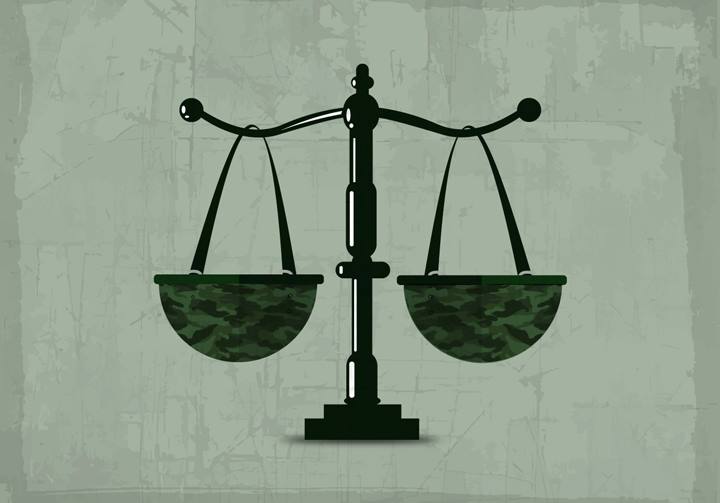Islamabad:
Justices of the Supreme Court Jamal Khan Commandkhail and Naeem Akhtar Afghan on Friday published a dissident opinion in the case related to the trial of civilians in the military courts, declaring that such martials of the courts are unconstitutional.
The minority decision of 35 pages firmly establishes that the jurisdiction of the Martial Court was limited exclusively to military personnel and cannot be extended to common civilians.
The judges ruled that the application of military jurisdiction to civilians was unconstitutional.
The dissident note critically examines the broader assumption that civil courts are unable to deal with high -profile terrorism cases, suggesting that this narrative was misleading.
He observes that it has generally been portrayed that civil courts have not handled serious crimes such as terrorism, and that military courts are the only remedy, but reality is the opposite.
Remembering the past precedent, the judges indicated that the military courts were temporarily authorized in 2015 to listen to certain cases related to terrorism. However, the experiment failed to eliminate terrorism, partly because military officers lack the judicial experience required to judge complex criminal issues.
The decision observes that worldwide, terrorism cases are not judged in military courts. He argues that criticism of the criminal justice system are out of place and points out that the absolute in civil courts often result from poor investigation, weak witnesses or politically loaded cases, not of judicial incompetence.
He pointed out that according to article 25 of the Constitution, all citizens are the same before the law and have the right to equal protection of the law. The principle of equal protection ensures that all citizens are treated equally under the law, regardless of their background, race, religion, political affiliation, action or other classifications.
“This is a fundamental right guaranteed by the Constitution, ensuring that the law is applied equally and that no one is above the law. Treat citizens differently, without a reasonable classification, equivalent to discrimination.”
“This happens when two people or groups of equally located people are treated differently. Discriminating people in legal procedures for their actions or the nature of a crime, it is a violation of the principle of equal before the law and they are entitled to equal protection of the law,” he said more.
“The security of a person’s life and freedom is a fundamental right, being free from arbitrary deprivation of life and freedom. Article 9 of the Constitution guarantees and guarantees that citizens have the right to protection against damage, physical danger, potential risks and threats to their life, unfair or illegal detention or the imprisonment and the action of any action that can eliminate their freedom or life, in all the circumstances, in all the circumstances or illegal.
In addition, he observed that an independent judiciary can act as a control over the power of the Government to guarantee the security of the life and freedom of citizens. The criminal justice system implies a set of laws and principles that provide a procedure, aim to protect the IFE and freedom of citizens, and guarantee order in society.
Article 10 of the Constitution guarantees safeguards regarding the arrest and detention of a person, with the right to consult and be defended by a legal practitioner of their own election. It also ensures that no person is detained in custody beyond a period of twenty -four hours without the authority of a magistrate.
“The martial courts established under the MJS, which consist of an executive, are not independent and impartial. They do not provide the constitutional protection of the life and freedom of a person, and safeguard in terms of their arrest and detention. Although detained in military custody, the provisions of the prison manual are not applicable to the people accused of military crime. in cameras “. “.” “.” “.” “
In addition, he pointed out that the right of the defendants to consult and be defended by a legal practitioner of his own election, guaranteed by the Constitution, was subject to the approval of the Chief of the General Staff of the Army or the Convention Officer, as provided by Rule 82 of the Law of the Army of Pakistan, Rules 1954.
“This is a fundamental right of a person under the article Sub-article (1) of article 10 of the Constitution, which cannot be conditioned. The custody of the accused of crime under clause (D) and the procedure adopted by the martial courts are inconsistent, they eliminate and reduce their fundamental rights, which is violated from articles 9 and 10 of the Constitution.”
The note declared that the right to fair evidence and due process is universally accepted as a fundamental right, therefore, the legislature, carrying out its importance and necessity, inserted article 10a in Chapter 1 of Part II of the Constitution, by the Law of the Constitution (thirteenth amendment), 2010.
“Fair trial and due process help limit abuse by governments and state authorities and guarantee the integrity and equity of the legal system. Due process has the requirement that the legal issue belonging to civil rights and obligations and a criminal position against a citizen is resolved in accordance with the law, the established rules and principles, based on the evidence presented.”
The dissent also criticizes federal and provincial governments, stating that, instead of investing and improving the civil justice system, they opted for civilians’ martials, a measure that exceeds constitutional limits.
The judges observed that the punishments transmitted to the civilians involved in May 9, 2023, the events of the military courts were beyond their jurisdiction and, therefore, null and null.
The note concludes by reiterating that the delivery of justice falls within the constitutional domain of the Civil Judiciary.
The rule of law requires that each citizen have the right to a fair trial, according to the decision.




